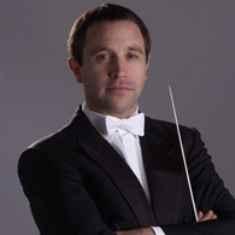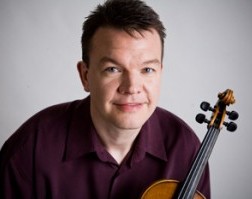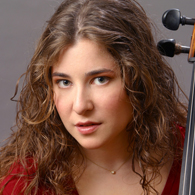
Take Flight with the CSO
When did classical music get so serious?

Certainly, that old kidder Franz Joseph Haydn would have none of it, having injected much humor into his music.
A prime example is Haydn’s Symphony No. 90 performed by the Cincinnati Symphony Orchestra led by guest conductor Mark Wigglesworth Friday night (April 16) at Music Hall. Surprisingly, it was a CSO subscription premiere, coming 222 years after it was penned in 1788 on commission from a French nobleman.
It would spoil the fun for those who have not yet heard the concert to give away Haydn’s prank – repeat is at 8 p.m. tonight at Music Hall. Let it only be said that if “Papa Haydn” could lighten up, so should we all. A native of Sussex, England, Wigglesworth is a busy free lancer with a worldwide presence. He introduced Haydn’s new/old music from memory and with spirit and precision, connecting closely with the CSO players. (The extent of Wigglesworth’s reach and his travels recalls that of CSO music director Paavo Järvi. He has served as associate conductor of the BBC Symphony and music director of the BBC National Orchestra of Wales and Opera Factory in London.)

Haydn’s sense of humor was only one reason to enjoy this
concert. Also on the program were Brahms’ Concerto for Violin, Cello and
Orchestra (“Double”) and another CSO premiere, British composer John Pickard’s “The
Flight of Icarus” (1990). Soloists in
the Brahms were CSO concertmaster Timothy Lees and cellist/guest artist Alisa
Weilerstein.

Member of a musical family, Weilerstein, 27, is embarked on a stellar career, with numerous high profile appearances to her credit, including the White House, where she was one of four artists invited to perform for President and First Lady Obama as part of an evening of classical music in November. The power of her playing in the Brahms somewhat belied her apple-cheeked image, both of which underline her star appeal.
Lees’ consummate musicianship and silvery tone spoke for itself in the concerto, where the two were somewhat mis-matched acoustically (at least from my seat in the balcony). Together, however, they conveyed well the emotional essence of the work. This was best achieved in the Andante, where their lines melted together, often in unison, for a sublime effect. The CSO, an equal partner in the work, sometimes got the better of both soloists but overall it was a very satisfying collaboration.
Pickard, who attended the concert and took part in a pre-concert conversation with CSO assistant conductor Vincent Lee (unfortunately, no word of this got out in advance), has crafted a jarring, searing metaphor on human nature and its recurrent tendency to over-reach. “The Flight of Icarus,” commissioned by the BBC Wales Orchestra and premiered in 1991 (by Jerzy Maksymiuk), ties in with contemporary space exploration, too, which has had its share of disasters (such as Apollo 13).
The 20-minute tone poem recalls the Greek legend of the Icarus, who in his exuberance at being able to fly on hand-made wings (of feathers and wax) flew too close to the sun, where his wings melted and sent him crashing into the sea.
Scored for large orchestra, including a multitude of percussion, it has an arc-shaped trajectory, beginning with a “lift-off,” powered by pounding timpani and heroic tuba. Fanfare-like trumpets celebrated Icarus’ giddy ascent as a broad melody in the strings tried to assert itself. The melody finally did, but then things got queasy. The tuba seemed to spell doom. The strings emitted sliding notes (portamento) and there was a great furor, extending even to the generally benign glockenspiel, before the harmony opened out onto a long, low note signaling Icarus’ fall. There was general lamentation to the end, which swelled to heroic proportions. There was a huge slashing dissonance before the harmony finally flat-lined on a low double bass rumble.
Pickard took a well-deserved bow. One wishes that he or Wigglesworth had been able to introduce the work to the full audience from the stage (unfortunately, there will be no pre-concert lecture tonight).
Haydn’s Symphony No. 90, programmed to end the concert, was in many ways the highlight of the evening. The performance was top notch, the musicians clearly enjoyed themselves, as did the audience, which went home smiling. Wigglesworth shaped it expertly, while letting the CSO musicians shine. He eased from the slow introduction into the opening Allegro just-so, then let it unfold graciously. There were charming solos by Randolph Bowman and Dwight Parry, principal flute and oboe respectively.
The slow movement (Andante) was another beauty, with more gorgeous solos by principal bassoonist William Winstead, Bowman and principal cellist Ilya Finkelshteyn, who somehow, magically, managed to match his tone quality to that of the bassoon (Winstead) at the end.
The Minuet movement was pure elegance, with Parry in another ravishing solo in the Trio section.
The finale took off briskly and innocently. The audience did its part splendidly (hear tonight’s repeat if you missed it) and the concert ended with zest and abundant take-away spirit.
Note: Instead of a pre-concert lecture, tonight’s performance will be preceded by a public forum on the CSO’s search for a new music director, beginning at 7 p.m. in Corbett Tower at Music Hall. Ann Santen, chair of the search committee, will preside. Paavo Järvi, CSO music director since 2001, announced in January that he will step down at the end of next season.